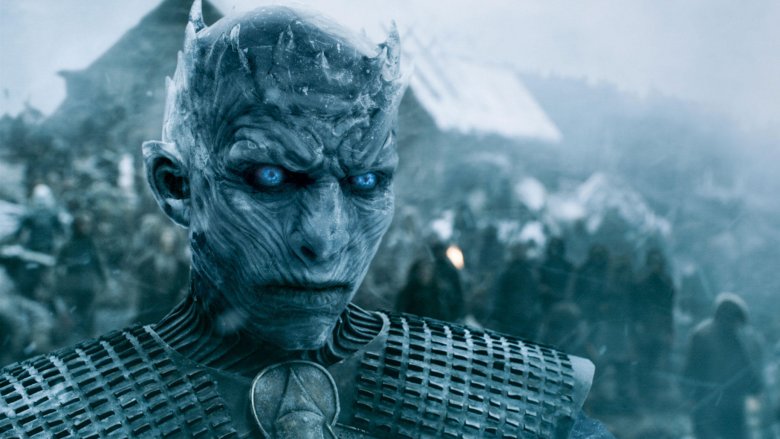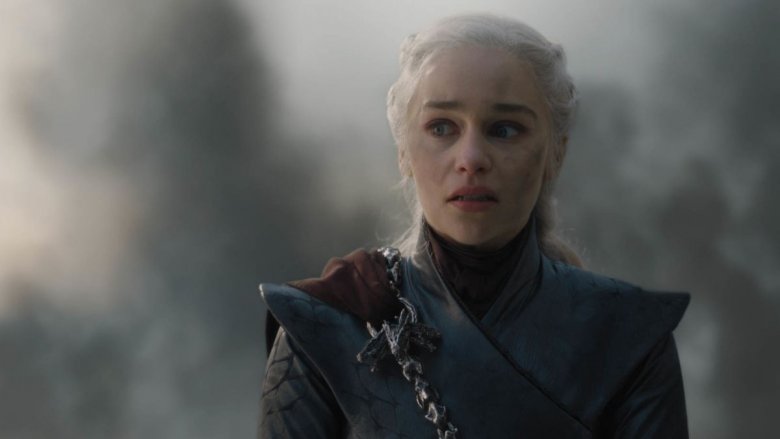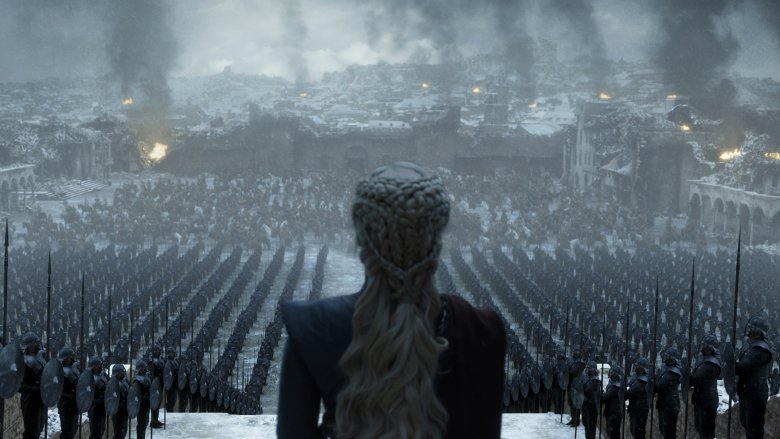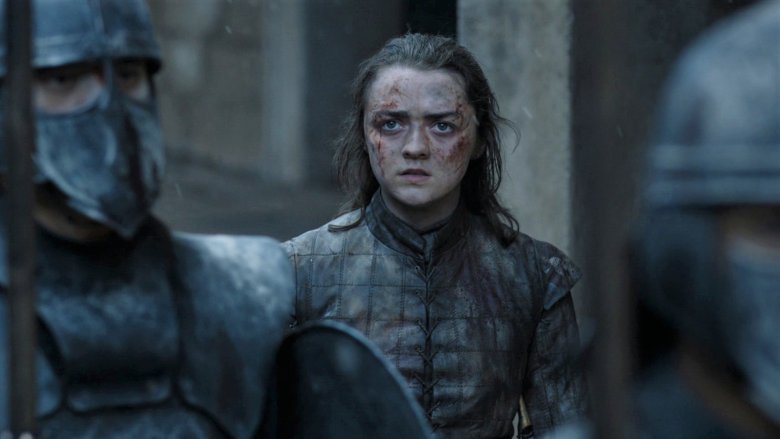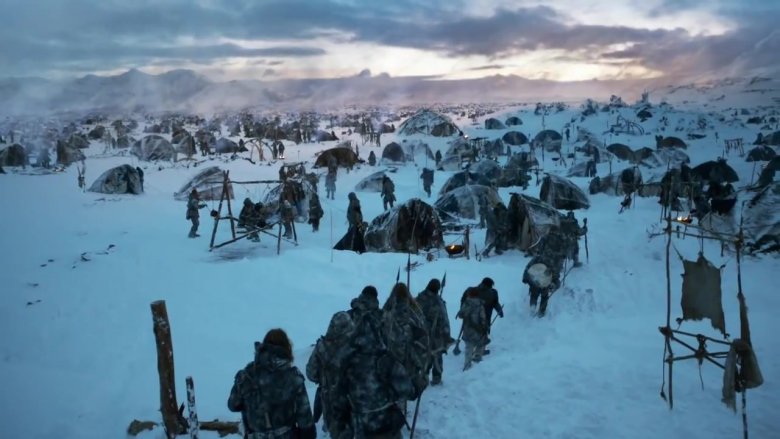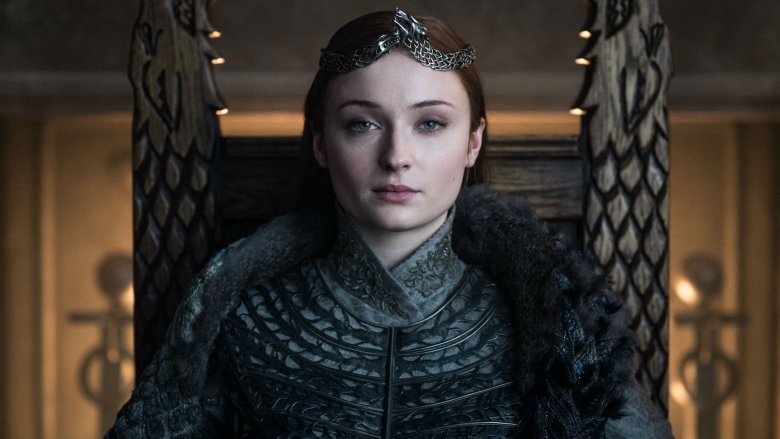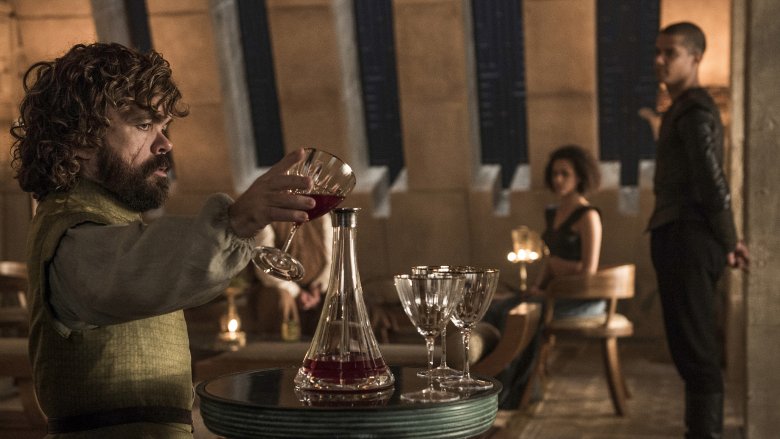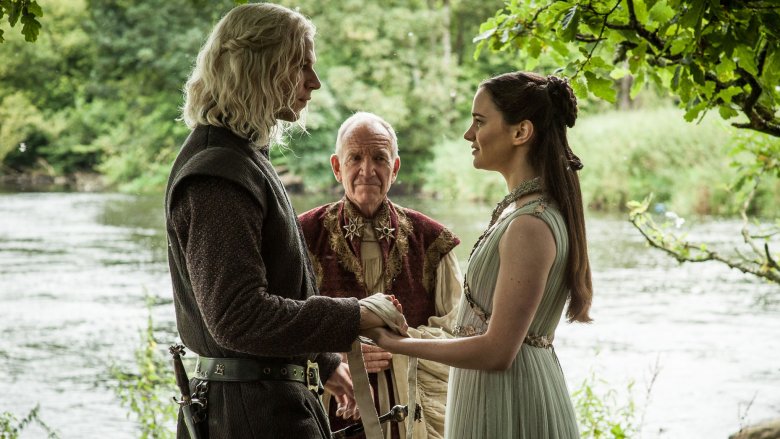Ways George R.R. Martin Can Fix Game Of Thrones' Ending In The Books
Game of Thrones has ended, but George R.R. Martin's A Song of Ice and Fire series is still underway. Five books have been published, and quite a lot of ancillary material — A World of Ice and Fire, Fire & Blood, and The Sons of the Dragon — has come out in the last few years, but two mammoth tomes remain to be written. With the series finale of the landmark HBO program proving to be controversial, fans turn to the books as possible saviors. Perhaps Daenerys doesn't have to die a mad traitor to her own cause. Maybe characters like Young Griff, who never existed in the show, could turn the tide entirely. Speculation runs rampant and tempers run high, but one thing is clear: Martin has an opportunity few creators ever do in being able to preview the reaction to his landmark saga's end. Here are a few ways he could make the Song of Ice and Fire finale go down a bit more smoothly than its TV equivalent, from sweeping changes to subtle adjustments.
Save the White Walkers for last
The Battle of Winterfell managed to surprise just about everybody, but more shocking than Arya's final blow or Lyanna Mormont's valiant exit was the fact that it wasn't, actually, the climax of the show. This upset many viewers, which may very well have been what the staff of the show were hoping for; but regardless of intent, it threw a fatal wrench in the series' themes.
For eight seasons, we were treated to warnings that winter was coming, that the petty squabblings of the nobility amounted to nothing compared to the threat of death itself. And then ... it turned out that stabbing the right guy was all it took, and, well, bloody-knuckled brawling for lands and titles was just fine, actually. If all Martin did was switch up the order of the final two battles, that'd go a long way towards bringing the books to a more graceful end than the TV series. Let readers watch as characters like Cersei perish in the arms of those who could not protect her, let Daenerys make her awful choices, let Jaime's terrible history sweep him away from all that might have brought him peace. Then, bedraggled, stand the survivors up against the enemy that truly matters and bring the story back to its thematic roots: when it comes to life and death, a king is the same as a commoner.
Spend more time in Daenerys' head
Daenerys' spiral into madness proved controversial. Though it can be argued that it was foreshadowed, so too was her care and compassion. Her breakdown at the ringing of the bells was cartoonish; sure, she'd been put through the wringer, and yes, she's prone to violence, but never really more than Jon Snow, who executed an orphaned child, or the Hound, who told Arya he regretted not raping her older sister and still got a redemption arc. In a world where force is omnipresent, it's bizarre to paint one character's use of it as particularly suspicious.
Martin has a big advantage over the show in this department, as Daenerys is a point of view character. Readers will be provided with more insight and, crucially, time to get used to the idea of Daenerys giving into her more Targaryen instincts. We'll be immersed in her spiraling thoughts, as she considers the risk of letting Cersei manipulate her kindness against the future of Westeros as a whole. This line of thinking braids her protective and aggressive instincts together into a far more believable storyline in which she judges the lives of the many to outweigh the deaths of the comparative few. Daenerys can still raze the city, but we'll understand how and why she got to that devastating point.
Abolish the monarchy entirely
Poor Sam. He made it to the top yet still ended up as a laughing stock when he suggested democracy for the future of Westeros. It's a dark little moment of humor, and an effective one — things may have changed, but power remains. That sort of cynicism set Game of Thrones apart from other fantasy series, and it wasn't a bad choice to end on at least one sour note. Cultural progress is slow, rarely linear, and takes a few tries to finally get where it's going.
But Martin's novels are an altogether grander affair, with hundreds more characters than the show, dozens of more locations, and thousands of years of history bearing down upon every event. A more dramatic ending would fit its wider scope — an ending like Sam proposed. It doesn't need to happen all at once, but setting Westeros on a very different path than the show ended on would make all the sturm und drang feel more worthwhile. Everyone who died would then, on some level, have done it to bring about something entirely new. Maybe it wouldn't work out. Maybe the nobles would still laugh. But it would be a definitive statement.
Use Myrcella to bring in Dorne and complicate Cersei's choices
Myrcella Baratheon mattered in Game of Thrones only as a bargaining chip, and then, after her murder by poisoned kiss, as a corpse to avenge. In the books, she's not only still alive — she's had quite the adventure. She has developed close friendships with the Martell family and her Kingsguard protector, Arys Oakheart. This goes awry when a plot to put her on the throne results in her losing an ear and gaining a dramatic facial scar — but she lived through it, and she's heading to King's Landing with a Sand Snake in tow.
As outlined in A Feast for Crows, according to her Dornish allies, Myrcella has the claim on the Iron Throne instead of Tommen. Imagine her as someone with an interest in the crown and the love of a region the show neglected: that could be engrossing as a plotline and as something to throw Cersei for a loop. Facing down everyone that isn't a member of her family is something Cersei will do with relish, but her beloved daughter, challenging her for the power she's coveted for so long? A daughter that has grown in confidence and acumen and has the support of a powerful part of the Seven Kingdoms? That could be scale-tipping indeed.
Pit Arya against Lady Stoneheart
Arya saved the entire world with a single, precise deathblow and she got to retain her independence, setting out in the last scene of the finale to explore whatever's "west of Westeros." This is a solid capper to one of Game of Thrones' most dependable character threads. Though Arya had her ups and downs, you could generally always count on her to stab what she needed to stab and get where she needed to go.
So stable was her personality, in fact, that it became something close to boring. It was indeed thrilling to watch her deliver the world from evil and set out towards parts unknown, but watching her struggle a little with something less easy would have given her ending a poignant and surprising new layer. Martin has a way to explore that in Lady Stoneheart, the revenge-minded revenant that once was Catelyn Stark. Arya having to use her well-honed skills on her own twisted mother would be a fascinating way to combine her martial skill with her abiding fealty to the Stark name. Arya would have to use Needle on someone she'd desperately want to spare, but couldn't out of sheer, cruel love. She could then go on to slay the Others (called White Walkers in the show) and set sail on thrilling tides, but this particular victory would underscore the cost at which her prowess came, and that would make a difference.
Involve the smallfolk more
The commoners, or "smallfolk" as they are referred to in the world of Westeros, were largely forgotten by the time the show ground to its laborious halt. Sure, they're discussed in the abstract, and yeah, Gendry got a castle of his own. But characters like Hot Pie and Edd weren't sitting around picking Bran as king — they were roasted en masse or shuffled off camera.
This isn't a tremendous reversal, as the show was always more concerned with the lives of its well-off characters. It's called Game of Thrones, after all, not Game of Stools in the Tavern Where the Hound Ate All Those Chickens. But much of the drama was, in theory, based around organizing a world in their favor. Martin's books have done a better job of incorporating that: much of A Feast for Crows is spent with those living in the ashes of the War of the Five Kings, to the point that the title is a descriptor of their lives in the aftermath. This could be explored even more deeply by following the journey of a few smallfolk characters, and seeing the war through their eyes.
Let Bran retain his personality
All hail Bran, the technical winner of Game of Thrones. He's king, he's omniscient, he never has to worry about following his predecessors down dark holes of lechery, madness, or greed because, as he said himself, he "doesn't really want, anymore." This is key to his victory, as Tyrion outlined so eloquently in the series finale: Bran transcended his limited individuality, emerging from the most traumatic moment of his life as the embodiment of the realm and its history. He "learned to fly" in the memories of others and became the perfect altruist, a king with no self beyond the realm.
The problem is that this made for some truly boring TV. Bran actually went missing from Season 5 entirely; someone had to make room for Jon, Daenerys, and Tyrion, and, well, no one was really out there yearning for more shots of Hodor shouldering Bran through the snow and endless, po-faced talk of destiny and ravens. Bran becoming an encyclopedia of Westerosi history more than a person is great for the realm, but plodding to watch. Martin hasn't stripped Bran of his self yet, and in fact most recently had him struggling with his growing feelings for Meera. If Martin continues to show the edges of Three-Eyed-Ravenhood and individual personality grinding against each other, it could make for a far more interesting story, and, potentially, kingship.
Let Sansa make more active choices
Sansa's had a tough time in both the books and the TV show. Though her ending is a victory, it also feels a bit like Sansa won an endurance contest instead of growing to become a true and righteous player of the game. This isn't to say she didn't accomplish a lot over the past few seasons: she turned the tide of the Battle of the Bastards, had Littlefinger executed, and was the only person to repeatedly and reliably advocate for common Northerners. But it might have been nice to see all that with a mite less assault on the road to Queendom and a bit more active choice.
In the books, Sansa is currently living undercover as Alayne Stone, Littlefinger's bastard daughter, and has grown to care for Robin Arryn. As in the show, he's a bit of a brat — but Sansa shows true concern for him as she lies low, waiting for whatever comes next. It would be thrilling to watch Sansa realize what a plum position she occupies, as an overlooked girl with the ear of the future Lord Protector of the Vale. Sansa could potentially become the most powerful person in that court and fight back against the growing menace of the Boltons without having to spend an interminable number of pages as Ramsay's ragdoll. It'd make for a more engaging story and a more satisfying ending when she takes her place on the Northern throne.
Root Tyrion's support of Daenerys in his time as a slave
Things aren't going so well for the Tyrion of the printed page. He's become more cynical after his murder of Shae and Tywin, and less interested in forgiveness of any sort. The world is repaying this growing ruthlessness in kind, as he spent much of A Dance with Dragons enslaved. After managing to get himself attached to the Second Sons, he is poised to sway Daenerys to his side and, presumably, follow much of the path we watched him tread in the last few seasons of Game of Thrones.
The time he spent in slavery beholden to the whims of others will always remain pronounced in comparison to the time he spent similarly in the show. This could be a tremendous asset to his characterization and Daenerys' plotline in general if Martin chooses to use it. It would give Tyrion more grounding in his support of the slave-freeing dragon queen, making his ultimate disillusionment that much more potent in addition to making him seem like less of a fool for believing in her in the first place. As it stands, Tyrion's scene with Jon, wherein he argues against her, seem tacked-on and stupid when he was so previously supportive of her claim. With a little more time spent as one of the powerless hordes Daenerys seeks to liberate, Tyrion's blindness would make more sense and become more emotionally affecting.
Make Jon's parentage more public
Jon's secret parentage caused no small level of turmoil in Daenerys' camp, as he turned out to be, simultaneously, her lover, her nephew, and her rival for the throne. This drove her to distance herself from him, go full-on Mad Queen, and, eventually, die beneath the throne she so coveted. Alas, poor Jon. He didn't even care about being legitimate; he only ever wanted to hang out with his wolf and make sure White Walkers didn't put the whole world on ice.
And .... it turns out he got to do just that, as no one really cared how royal he was after Daenerys was dispatched. This is a concerted statement on the new path the Westerosi nobles are attempting to take — they choose Bran in spite of Jon's claim — but it's also a bit of a letdown. Jon's ancestry isn't just shocking on its own, it's a continent-shaking detail that reveals the major conflicts of the past generation to have been built on selfish lies. Martin could stick the landing more securely by examining more characters' reactions to the news, chronicling their disillusionment, anger, and perhaps even satisfaction. Not only could this be edifying, but it would be a pitch-perfect summation to one of the books' most prominent themes: power will do anything to justify itself, despite its many failings. Let the world know just how much blood was shed because of a dalliance, and let it have its say.

